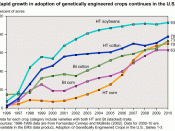Many people today are concerned about the benefits of genetically modified foods. Activist groups such as Greenpeace and Friends of the Earth heighten fears by halting boats shipping bioengineered products to other countries. Some groups have even gone so far as to set fire to the labs that conduct biological experiments, only to complain later that, "not enough research is being done to prove its safety."
It has been noted by Adrian Bebb of Friends of the Earth Europe that many Americans would like to see more restrictions on biotech foods. They just may have their way, since under the "Precautionary Principle," American activist groups do not need to show scientifically that a crop is unsafe before banning it; they simply need only assert that it has not been proven harmless (par.1). However, scientists are discovering more and more reasons why we should support the future of biotech experimentations.
Firstly, since 1995, tens of millions of Americans have been eating genetically modified foods without even being aware of it.
Snacks, processed foods, and other foods that have been "tampered with" fill an estimated sixty percent of U.S. grocery shelves. One scientific panel after another has concluded that biotech foods are safe to eat, including the FDA. This is because all genes from any edible source are made up of the same four DNA bases, which all undergo digestive breakdown when eaten. However, some still see this as an outrage against Mother Nature.
"We're in a war," said an anti-biotech activist at the World Trade Organization meeting of 1999, "We're going to bury this first wave of biotech. The first battle is labeling. The second battle is banning it." The protesters had their reasons for this meeting; A month before, a cyclone had ripped apart the Coast of Orissa, India, killing...


